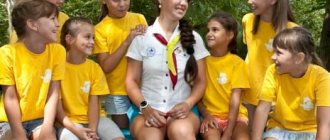Tasks:
- Adaptation to new living conditions
- getting to know the guys in the squad
- <dating games
- business cards
- light of acquaintance
- newspaper "This is us"
- signs on the wards
- bed plan
- KTD "creative association of namesakes." (You need to teach them to respect names and not allow nicknames)
- writing hour
- encounters and other surprises
- games for contact and trust
- legends
- traditions
- rituals
- secrets
- inscription welcoming children upon arrival
- welcome newspaper with letters and wishes from the guys from the last shift
- tour of the territory
- getting to know the housekeeping and teaching staff)
- presentation of EPT
- getting to know the daily routine
- household collection
- safety precautions for signature
- camp laws
- personal example of a counselor
- individual conversations
- relations in the teaching staff
- cleaning the area
- duty in the wards, dining room, territory
- morning lineup
- morning information gathering of the detachment
.
Important: constant monitoring of compliance with norms and acceptance of norms at a conscious level.).
- Discovering and developing the child’s capabilities
- determining the interests and abilities of each child
- questionnaires for children or parents
- observation
- light "My hobby"
- KTD "Live Questionnaire"
- interest identification games
- getting to know the clubs
- many KTD in different directions
- detachment
- motto
- chant
- song
- emblem
- symbol
- ritual
- traditions
- charter
- observation
- leader games
- sociometry
- duty
- asset selection
- development of microgroups
- planning your child's own activities
- enrollment in clubs
- end of shift letters
- we give ideas for things to do that we want to do in the squad during a shift
- getting the teams to know each other
- choice of self-government bodies
- choice of form of self-government
- delegation of one representative to the active camp
- distribution of responsibilities in the camp assets
- mayoral elections with pre-election struggle
- camp meeting
- planning general camp affairs
· Japanese.
Everyone is in a tight circle, shoulder to shoulder. The leader behind the circle. He approaches any player, knocks on him (on the back) and says:
- I’m Japanese..... (says his name), and who are you? - I am Japanese..... (also calls himself). Why did you come? - Come with me for a walk to Mount Fuji. - Let's go to.
Both players scatter on opposite sides of the circle. When they meet, they greet each other with their fists in Japanese: “Posikota - posikota.” As they reach their circle, everyone tries to stand in the vacant seat. Those who do not have enough space become the presenter.
! Girls choose boys, and boys choose girls. ! This game must be played on a soft surface (sand, grass...)! The counselor chooses the one whom no one has chosen.
Tasks of the fixing block:
creating conditions for the child to demonstrate the experience acquired in the camp (parents' day, creative reports from clubs, open squad activities for the entire camp (creative Arbat, neighbors' relay race - excursions to the squad site. Guests are welcomed by different groups of the squad. You can host several squads at once or by age The criterion for success is the initiative of the children.
- Associations of interests (circles)
Target
— summing up the results of the shift, readapting the child to return to his PDC.
Getting to know the entire camp staff, except the counselors.
- Pathfinders.
Each squad is given encrypted information “The Legend of One Person Who Must Be Found”: a description of the person based on his service in the camp, a meeting place and a password. For example:
He loves to eat very much. Therefore, he often visits places where food is collected. To the phrase “Your milk has run out,” he replies: “Participates in Happy Starts.”
We need to find this person, interview him about himself and his service and invite him to the Meeting. Then the teams prepare their performance: a presentation and story about the person they found, an advertisement for his service and a themed gift for this person. The squads take turns performing from the stage, each representing their own person.
- The Thirtieth Kingdom
is a more complex option. On the stage, three heroes (counsellors) travel around the kingdom and find a stone with the inscription: “If you go to the left, you will be full and healthy” - here they meet in turn a physical education teacher, a cook, and a doctor. “If you go to the right, you will be rich and cheerful,” - supply manager, music worker, cultural activists, circle experts. “If you go straight, you will be wise,” - librarian, senior counselor, boss, methodologist, psychologist, computer specialist. Each of the people we meet either creatively introduces themselves or holds a competition for the audience.
Tasks:
- Collective assessment of the experience gained, awareness of the growth of VDK
- final squad meeting
- presentation of certificates
- methods for determining the level of development of a team - sociometry, Lutoshkin classification
- farewell evening “I leave you as a souvenir”, LZS
- farewell light
- reading and analyzing a letter to yourself at the end of the shift
- farewell vernissage - expressing yourself through objects in a composition with a name
- design of the general exhibition of the detachment
- KTD “Soon we’ll say goodbye to the camp”
- walks to your favorite places
- Good bureau for making souvenirs to remember the camp
- exchange of wishes
- exchange of addresses for correspondence
- meeting agreement
- conversation “What will you do after the camp”
- individual recommendations on how to develop the talent discovered in the camp
- you can give out case scenarios or have them rewritten
- cleaning the territory and premises
- assistance to counselors in making business cards, greetings
- writing letters of feedback to the counselor about his work
- wishes for the future
You can read only after the children have left. You can write an audio letter.







